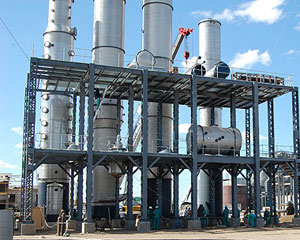
MWENEZI — Small dilapidated houses with their roofs falling, straddle for kilometres along the Ngundu-Triangle road and vandalised irrigation infrastructure are all that remains from business magnate, Billy Rautenbach’s dream of setting up an ethanol plant in Masvingo.
By Tatenda Chitagu
The houses, built using expensive bricks, lie derelict and neglected, yet this was supposed to be the country’s second ethanol project before Chisumbanje came into the picture.
They were built in 2008 to cater for people that he, through his company Zimbabwe Bio-Energy (ZBE), wanted to move off the land where he wanted to set up the plant in the vast Nuanetsi Ranch in Mwenezi.
He also brought state-of-the-art irrigation equipment for one-hectare plots where the villagers would have to be resettled and set up offices and a workshop at the site.
Just opposite, blasted quarry stones lie in heaps, with grass outgrowing the piles meant for construction of offices and houses. But six years down the line, the project remains still-born due to political bickering caused by factionalism in the ruling Zanu PF party.
“We could have set up a plant here before moving to Chisumbanje. The resources that were meant for this ethanol plant were however re-channelled to the Chisumbanje plant after spanners were thrown in the way,” a senior employee at ZBE said on condition of anonymity due to company protocol.
A fierce but subtle factional battleby politicians to strategically position themselves for an eventual takeover from 90-year-old President Robert Mugabe, is said to be responsible for the failure of the project takeoff.
- Chamisa under fire over US$120K donation
- Mavhunga puts DeMbare into Chibuku quarterfinals
- Pension funds bet on Cabora Bassa oilfields
- Councils defy govt fire tender directive
Keep Reading
For being with the wrong faction at the wrong time, sources said, Billy was frustrated until he abandoned the area.
“Factionalism took centre stage as the project could have financially made another faction stronger and it just died like that. That is why you see those houses were just left to rot,” said an official.
Another source said a frustrated Billy then moved to Chisumbanje where he set up the current plant that has got its fair share of problems.
ZBE public relations manager, Lillian Muungani could not reveal what stalled the project as she did not respond to questions sent to her.
But a company that partnered ZBE in the project, the Development Trust of Zimbabwe (DTZ), admitted that political squabbling is to blame for the failure of the ethanol project to take-off.
“Lack of unity within political leadership structures manifested itself when some of the political leaders within Masvingo took the position that the project could not go ahead because the whole of Nuanetsi Ranch is targeted for the resettlement of people from Tokwe-Mukosi [dam],” Charles Madonko, the DTZ Nuanetsi resident director told our sister paper, the Zimbabwe Independent last week.
“DTZ had offered, through Agriculture minister Joseph Made, that the need to resettle people can be achieved by designing the programme around the canal route to be constructed when drawing water from Tokwe-Mukosi.”
Madonko said at the technical levels, both the investment and resettlement of people could be achieved.
“However, effectively this matter became a subject of bickering among leaders and there was no concerted effort to address the technical issues of water and the illegal settlers so as to instill investor confidence,” he said.
“These factors combined to effectively undermine investor confidence. The investment blueprint was very relevant to the needs of our people but the supervisory political environment was not.”
Now, efforts to revive the ethanol project, which according to the company, is set to create more than 5 000 jobs and create 2 000 out-growers who will supply cane to the ethanol plant, seems unlikely to kick-off owing to political bickering as well as the settlement of 18 000 Tokwe Mukosi flood victims in February this year in the ranch.
The flood survivors occupied a portion of the ranch where the infrastructure for the project was supposed to be established. Asked what was stalling the plant now that water will be abundantly available from the country’s largest inland water reservoir upon completion, the Tokwe-Mukosi dam, Provincial Affairs minister Kudakwashe Bhasikiti, proffesed ignorance over the project.
“I do not know about the project. Go and ask the people who told you,” Bhasikiti said.
Muungani also refused to comment on what went so wrong that the ethanol project had to be abandoned.











